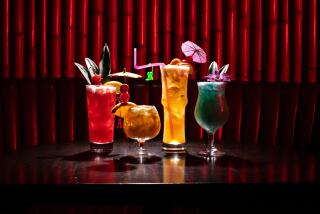In a city, county or state, booze laws can run wet, dry or damp
- Share via
WHISKEY, whiskey, everywhere. Nor any drop to drink.
That’s the story of tours at the Jack Daniel’s Distillery in Lynchburg, Tenn., where more than 200,000 visitors each year get a behind-the-scenes look at how whiskey is made.
What they don’t get is a drink.
“You get all the non-alcoholic lemonade and coffee that you want after the tour,” said Roger E. Brashears Jr., the company’s Lynchburg promotions director. “But you cannot sample the wares.”
That’s because Lynchburg is dry, banning single-drink and packaged sales of distilled liquor and wine. Under a special exception, Brashears’ distillery can sell its bottled product -- but not on Sundays. That’s forbidden by another law.
Such is the complexity of our nation’s patchwork of liquor regulations, which vary from state to state, city to city and, it seems, moment to moment. Keeping it all straight is enough to drive a tourist to drink.
More than 70 years after the end of Prohibition, there’s little consensus in America on where and when you can imbibe.
So-called blue laws, banning sales of alcoholic beverages on Sundays and some holidays, remain in force in hundreds of cities and counties. Wet and dry jurisdictions giddily overlap. Popping open a can of beer in a vehicle’s passenger compartment is fine in some places, verboten in others.
Some alcohol regulations apply statewide; others are fiercely local, dictated by the results of city or county referendums. Although restrictions are more common in the South, experts say, they can appear anywhere.
Guess wrong about such laws, and you could wind up in jail or, at the minimum, disappoint friends who hoped you’d bring back a liquid souvenir.
There are at least two liquor rules that are standard in the U.S.: the minimum drinking age and the legal blood-alcohol limit.
All states now set 21 as the youngest legal drinking age, said Brandy Nannini, vice president of government affairs for the Century Council in Washington, D.C., a nonprofit group funded by distillers to fight drunken driving and underage drinking.
Two decades ago, the drinking age commonly varied between 18 and 21, she said. But states soon decided to go with 21 after a 1984 federal law withheld highway funds from those that didn’t adopt that standard.
Similar pressure, in a 2000 law passed by Congress, has helped persuade states to adopt a blood-alcohol concentration of 0.08% as the main standard for determining drunken driving, Nannini said. On Aug. 1, Minnesota became the last state to do so. Previously, some laws set the level at 0.10%.
But no such uniformity exists in several other areas of the law:
* Wet versus dry: There’s not even agreement on definitions. Some dry jurisdictions regulate only distilled liquors, such as whiskey and vodka; others also regulate wine and beer. Some ban single-drink sales and allow packaged sales; some ban both.
In Alaska, some communities are dubbed “damp” because they ban sales but allow importation and possession of alcohol, according to the National Alcoholic Beverage Control Assn. in Alexandria, Va., which compiles an annual survey of liquor laws.
Adding to the confusion, wet cities may be in dry counties.
“That’s typical of Virginia,” said Becky Gettings, spokeswoman for the Virginia Department of Alcoholic Beverage Control in Richmond. “Sometimes there are strange laws. It’s a conservative state.”
As in other states, local referendums, not the legislature, may set many liquor laws.
Virginia is hardly unique in legal oddities. In Kentucky, Christian County is wet, said Jennifer Powell, spokeswoman for the Jack Daniel’s brand in Louisville. On the other hand, many distilleries in the U.S. are in dry counties, Brashears said.
* Sunday bans: Restricting sales of alcohol on Sundays is still fairly common. But the tide seems to be turning against these “blue laws,” so named, some think, because they were originally printed on blue paper in Colonial days.
Thirty-three states, including California, permit Sunday sales of distilled spirits, at least to some degree, according to the Distilled Spirits Council of the United States Inc. in Washington, D.C., a national trade association representing producers and marketers of distilled spirits. Some of these states may limit sales to certain areas or allow cities and counties to make their own rules.
Since 2002 about a dozen states have rolled back Sunday sales bans, according to the council. Washington state, for example, did so on July 24.
Opponents of blue laws say retailers can’t afford to lose income from the second busiest shopping day, after Saturday. But some activists oppose Sunday sales on religious grounds, and some retailers do so because they want the day off.
* Open containers: In the District of Columbia and at least 36 states, including California, it’s illegal for anyone -- driver or passenger -- to possess an open alcoholic beverage container or to drink alcohol in the passenger area of a motor vehicle, according to the National Highway Traffic Safety Administration.
As with other liquor laws, the federal government has applied muscle: Under a 1998 rule, states that don’t ban open containers may see a part of their federal highway funds diverted to other programs, such as enforcement of drunken driving laws.
The ban that passes federal muster allows for exceptions. For instance, you may be able to drink in the living quarters of a motor home or in the passenger compartment of a commercial vehicle, such as bus, taxi or limousine.
To learn about local liquor laws, contact a state’s relevant agency, which may be listed under titles such as “alcohol beverage control board” or “state liquor authority.” The National Alcoholic Beverage Control Assn.’s survey is free to members; for others, it costs $265. Visit www.nabca.org, and click on “Publications.”
*
Hear more tips from Jane Engle on Travel Insider topics at latimes.com/engle. She welcomes comments but can’t respond individually to letters and calls. Write to Travel Insider, L.A. Times, 202 W. 1st St., L.A., CA 90012, or e-mail jane.engle@latimes.com.
More to Read
Sign up for The Wild
We’ll help you find the best places to hike, bike and run, as well as the perfect silent spots for meditation and yoga.
You may occasionally receive promotional content from the Los Angeles Times.






